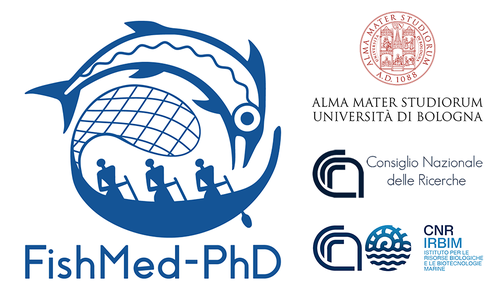- Home
- News
- ABOUT US Apri sottomenù
- Facilities and equipment Apri sottomenù
- RESEARCH Apri sottomenù
-
International PhD
Apri sottomenù
- Topics
- Academic Board
- Council
- Board of Advisors
- PhD Program Single Annual Datasheet - SUA-PHD
- Specific training activities for the FishMed-PhD program: course units
- Soft skills, Seminars, Laboratory activities
- Teaching week 2025
- Teaching week 2024
- Teaching week 2023
- Teaching week 2022
- Teaching week 2021
- FishMed-PhD students
- FishMed-PhD paper
- Call for applicants 41° FishMed-PhD
- Call for applicants 40° FishMed-PhD
- Call for applicants 39° FishMed-PhD
- Call for applicants 38° FishMed-PhD
- Call for applicants 37° FishMed-PhD
- Call for applicants 36° FishMed-PhD
- Call for Applicants 35° FishMed-PhD
- Call for Applicants 34° FishMed-PhD
- Final Exam FishMed-PhD 36th cycle
- Final exam FishMed-PhD 35th cycle
- Final exam FishMed-PhD 34th cycle
- Collaborations
- CONTACT
Specific training activities for the FishMed-PhD program: course units
Mandatory attendance

Group 1
- Metagenomics applied to microbiota sciences
- Biomineralization; origin, evolution and diagenetic processes
- Electronic microscopy, theory, instrumentation and practical examples
- Growth models and population dynamics in the context of climate change
- Models of embryogenesis and biomineralization
- Comparative genomics: change in genome architecture during animal evolution
- Molecular physiology of marine animals threatened by climate change and emerging pollutants
- Hologenomics applied to host-microbiota interactions in marine organisms
- Crystallization in biomineralization and in the environment
- Oceanography and biogeochemistry
Metagenomics applied to microbiota sciences
Leggi dettagliBiomineralization; origin, evolution and diagenetic processes
Leggi dettagliElectronic microscopy, theory, instrumentation and practical examples
Leggi dettagliGrowth models and population dynamics in the context of climate change
Leggi dettagliModels of embryogenesis and biomineralization
Leggi dettagliComparative genomics: change in genome architecture during animal evolution
Leggi dettagliMolecular physiology of marine animals threatened by climate change and emerging pollutants
Leggi dettagliHologenomics applied to host-microbiota interactions in marine organisms
Leggi dettagliCrystallization in biomineralization and in the environment
Leggi dettagliOceanography and biogeochemistry
Leggi dettagliGroup 2
- Fluctuations in fish populations
- Food webs, climate change and resource management in Northern Europe
- Safety of fish products; Microbial food webs and teleost microbiome
- Chemical contaminants and quality of fish products
- Marine biological resources in the Adriatic
- Indicators for sustainable fishing from the point of view of the state of the stocks
- Ecological engineering to increase the productivity of the marine environment
- Technologies for sustainable fishing
- Human population dynamics in traditional fishing communities; genetics, nutrition, health
- Genomic approaches in fisheries research: challenges and opportunities
Fluctuations in fish populations
Leggi dettagliFood webs, climate change and resource management in Northern Europe
Leggi dettagliSafety of fish products; Microbial food webs and teleost microbiome
Leggi dettagliChemical contaminants and quality of fish products
Leggi dettagliMarine biological resources in the Adriatic
Leggi dettagliIndicators for sustainable fishing from the point of view of the state of the stocks
Leggi dettagliEcological engineering to increase the productivity of the marine environment
Leggi dettagliTechnologies for sustainable fishing
Leggi dettagliHuman population dynamics in traditional fishing communities; genetics, nutrition, health
Leggi dettagliGenomic approaches in fisheries research: challenges and opportunities
Leggi dettagliGroup 3
- Economics and politics of marine resources
- Valorization of waste materials from fishing and mariculture
- Principles of fisheries economics and policy
- Bioremediation
- Ecology of marine phytoplankton
- Economics and politics of marine resources and fisheries, circular economy and environmental remediation
Economics and politics of marine resources
Leggi dettagliValorization of waste materials from fishing and mariculture
Leggi dettagliPrinciples of fisheries economics and policy
Leggi dettagliBioremediation
Leggi dettagliEcology of marine phytoplankton
Leggi dettagliEconomics and politics of marine resources and fisheries, circular economy and environmental remediation
Leggi dettagliActivities to be carried out by Doctoral candidates
Individual PhD research projects will merge the limited available knowledge with new insights generated by FishMed-PhD to assess fishery and ecosystem status and integrate this knowledge into a wider policy and social matrix of transparent and usable outputs that are urgently needed by policymakers, managers, and stakeholders. FishMed-PhD combines new interdisciplinary research approaches, organized into four work packages (WPs): WP1: Organism Biology and Physiology. Students quantify ecosystem responses to changing factors (e.g., climate change) using a multiscale approach, from the organism to the population and community levels. They conduct molecular, physiological, and morphological studies under controlled and field conditions. WP2: Environmental Monitoring and Conservation. Students use field surveys, remote sensing, species distribution modeling, and Citizen Science approaches to assess biodiversity status in relation to stressors. Additionally, they learn to identify and quantify pollution sources (e.g., hydrocarbons, microplastics) and implement innovative bioremediation techniques. WP3: Ecosystem and Socioeconomic Models. Students utilize physiological and autoecological descriptors, as well as time series analyses, to simulate alternative scenarios of environmental status and associated ecosystem services. They assess the ecological and socioeconomic impacts of these scenarios (e.g., ecosystem resilience, fisheries, coastal development, tourism). WP4: Risk Assessment and Integration into Policy and Society. Students study interactions between economic activities, assess potential risks to ecosystem services, and contribute to the development of decision-support tools. These tools aid policymakers in choosing the most sustainable strategies while effectively communicating the consequences of these strategies to stakeholders and society.